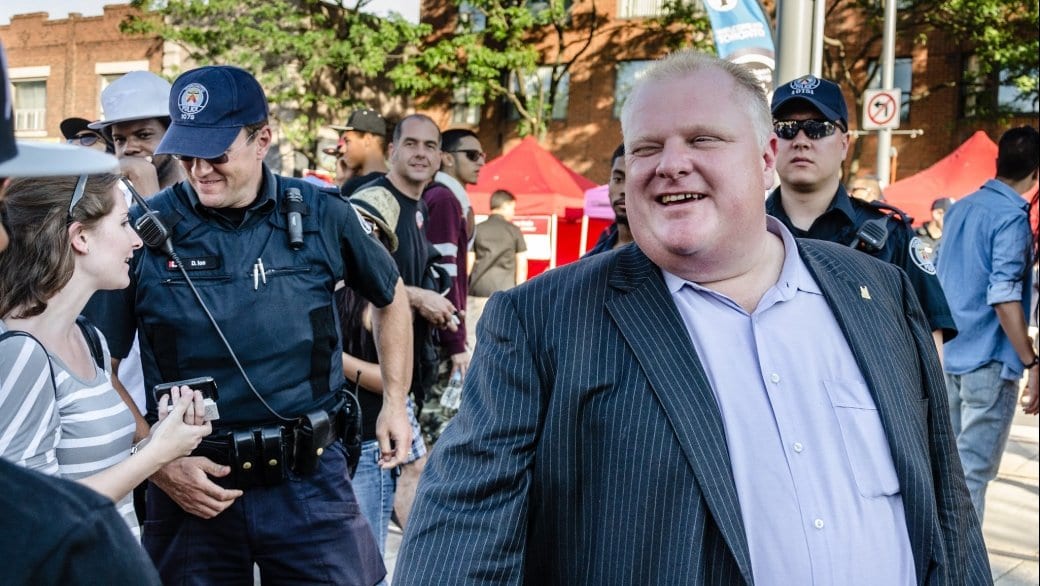“First they ignore you, then they laugh at you, then they fight you, then you win.”
It might be weird to open an obituary for the scandal-prone former mayor of Toronto with the words commonly, but incorrectly, attributed to Indian freedom fighter Mahatma Gandhi, but when I think back on Rob Ford’s legacy, I’m struck by how accurate an assessment of Ford’s political career that rallying call turned out to be.
When Ford was just a sole councillor representing a distant suburban ward and alienating fellow councillors with his quixotic demands to end snacks at council meetings and reduce office budgets, his racist and homophobic remarks were initially paid little heed. After all, even the conservatives on council despised him — it’s not like he would ever wield power or influence.
As Ford’s bigoted remarks accumulated, he became a punchline. Urban progressives of all types clutched our pearls in shock and denial that a person could hold such retrograde views in a country where LGBT people had won so many legal rights. Future city councillor Kristyn Wong-Tam staged a die-in at his office to protest his comments about “Orientals.”
While we laughed among ourselves, Ford was out building a constituency. When Ford announced his run for mayor, NOW Magazine put a fat joke in its headline – and they were not alone in reducing the man to jokes about his weight. The Star’s Royson James called him a “barbarian at the gate” and scoffed at his chances.
As the 2010 mayoral race dragged on, the community belatedly realized that Ford had built a following and had become a danger. There were attempts to fight back. Protesters appeared at his events. His record of bigotry was dug up and became a kind of mantra that progressives repeated to each other through the summer of 2010. But it was too late. With no inspiring options to vote for, the fight was unfocused and undisciplined. Ford captured nearly half the vote in the city. He even won around 20 percent of the vote in downtown wards, including in the Village.
In the wake of Ford’s victory, Gandhi’s words played out again. It turned out the 2010 election was just round one.
Despite the fantasies of downtown progressives, ignorance isn’t something that had been eliminated in Toronto until Ford brought it back like bedbugs from a hotel. Ford spoke to a decade of resentments built up since the city was forcibly amalgamated with its suburbs, and to fears stemming from a major recession.
Over the first year of his term, the demands of activists were ignored and laughed at and dismissed as the concerns of downtown elites. Ford’s victory spilled over into the federal election, where Harper captured a plurality of Toronto ridings.
As his term dragged on, Ford lurched from scandal to humiliation to disgrace even as his right-wing allies helped him attempt to push through an agenda of cuts, often directed at LGBT groups and services. Ford himself became a kind of avatar for the kind of unthinking bigotry and homophobia that our traditional right-wing parties are generally too polite to endorse. When violence erupted against LGBT protesters at a Ford campaign event in 2014, it exposed a truth that should be have been evident all along: these attitudes are still out there.
Yet while his mayoralty was disastrous in many respects, the Ford era was a time of unprecedented civic action and activism. A generation of activists was born out of Ford’s election and they learned the skills needed to advocate for policy change by fighting Ford for four years.
Crucially, Ford awakened an LGBT community that had become complacent in the wake of our equal marriage victory a half-decade earlier. Ordinary LGBT people recognized the importance of having allies at city council and counted themselves as activists — some for the first time ever — and rebuilt networks across the city to broaden our reach. Pride Toronto’s recent cooperation with Black Lives Matter Toronto is a good example of the kind of important outreach and collaboration that we need to do to consolidate our movement.
True, we didn’t elect a progressive in 2014, but queer people were a big part of John Tory’s winning coalition, and Tory has proven himself to be an LGBT ally throughout his career. Trudeau’s sweep of the city last year could also be seen as a repudiation of the ugly negativity and excesses of the Ford era that had come to be so closely associated with conservatives generally.
It’s impossible to look back on Rob Ford’s legacy and not miss the strain of ugly homophobia and transphobia he preached, practised and encouraged during his 16 years as a city councillor and mayor of Toronto. But for all that he was a terrible mayor of Toronto, his term was a crucible from which the LGBT community emerged stronger than ever.
Editor’s note, March 23, 2016: A previous version of this story incorrectly attributed a quote to Mahatma Gandhi.


 Why you can trust Xtra
Why you can trust Xtra


